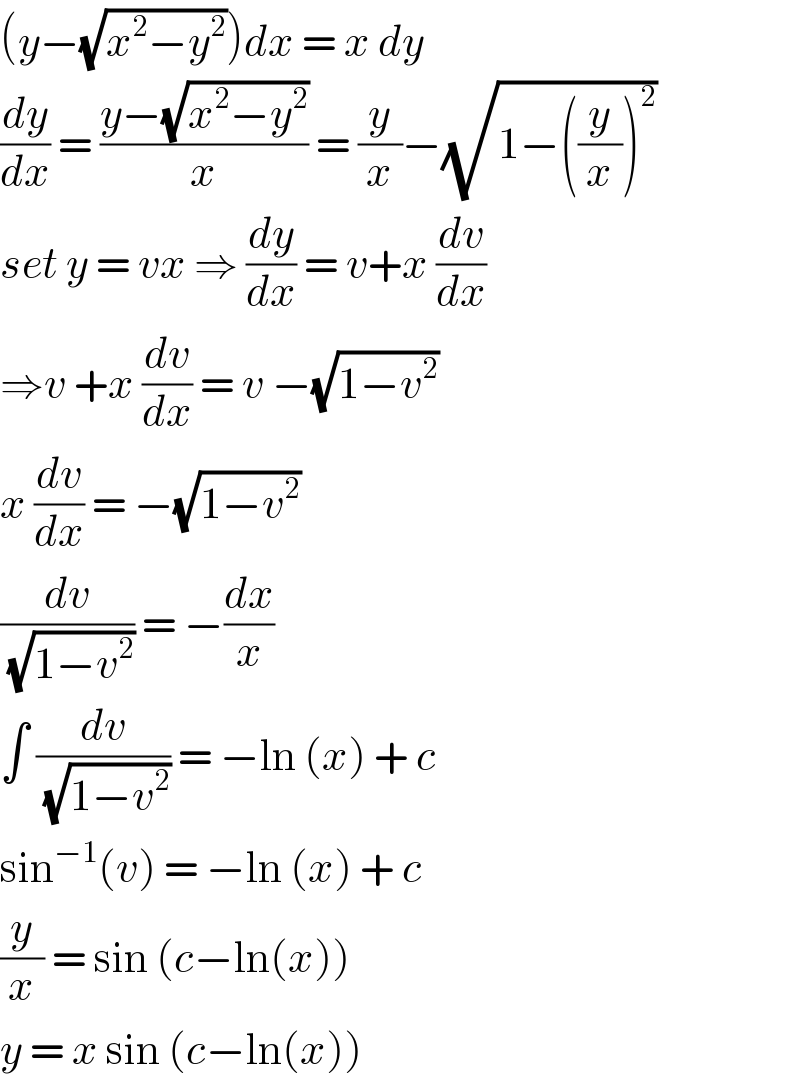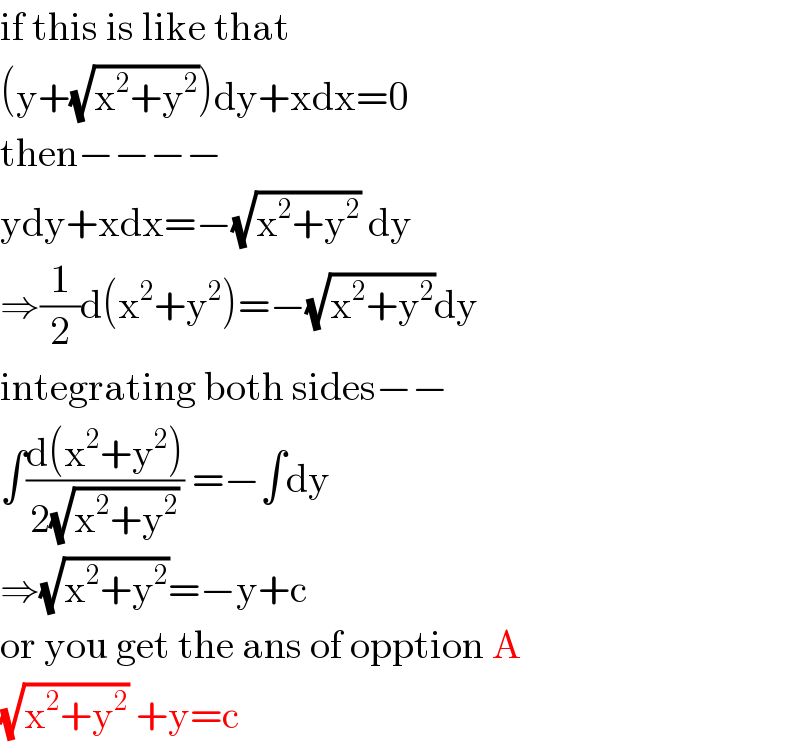
Question Number 96012 by mhmd last updated on 29/May/20

Commented by john santu last updated on 29/May/20

$$\left({y}−\sqrt{{x}^{\mathrm{2}} −{y}^{\mathrm{2}} }\right){dx}\:=\:{x}\:{dy}\: \\ $$$$\frac{{dy}}{{dx}}\:=\:\frac{{y}−\sqrt{{x}^{\mathrm{2}} −{y}^{\mathrm{2}} }}{{x}}\:=\:\frac{{y}}{{x}}−\sqrt{\mathrm{1}−\left(\frac{{y}}{{x}}\right)^{\mathrm{2}} } \\ $$$${set}\:{y}\:=\:{vx}\:\Rightarrow\:\frac{{dy}}{{dx}}\:=\:{v}+{x}\:\frac{{dv}}{{dx}} \\ $$$$\Rightarrow{v}\:+{x}\:\frac{{dv}}{{dx}}\:=\:{v}\:−\sqrt{\mathrm{1}−{v}^{\mathrm{2}} }\: \\ $$$${x}\:\frac{{dv}}{{dx}}\:=\:−\sqrt{\mathrm{1}−{v}^{\mathrm{2}} }\: \\ $$$$\frac{{dv}}{\sqrt{\mathrm{1}−{v}^{\mathrm{2}} }}\:=\:−\frac{{dx}}{{x}}\: \\ $$$$\int\:\frac{{dv}}{\sqrt{\mathrm{1}−{v}^{\mathrm{2}} }}\:=\:−\mathrm{ln}\:\left({x}\right)\:+\:{c}\: \\ $$$$\mathrm{sin}^{−\mathrm{1}} \left({v}\right)\:=\:−\mathrm{ln}\:\left({x}\right)\:+\:{c}\: \\ $$$$\frac{{y}}{{x}}\:=\:\mathrm{sin}\:\left({c}−\mathrm{ln}\left({x}\right)\right)\: \\ $$$${y}\:=\:{x}\:\mathrm{sin}\:\left({c}−\mathrm{ln}\left({x}\right)\right)\: \\ $$
Answered by Sourav mridha last updated on 29/May/20
![(y−(√(x^2 −y^2 )))dx−xdy=0 ⇒ydx−xdy=(√(x^2 −y^2 ))dx ⇒−[((xdy−ydx)/x^2 )]=x(√(1−((y/x))^2 )) (dx/x^2 ) integrating both sides−− ⇒−∫[((d((y/x)))/((√(1−((y/x))^2 )) ))] =∫(dx/x) ⇒−sin^(−1) ((y/x))=ln(cx) so,y=−xsin(ln(cx)).](Q96030.png)
$$\left(\boldsymbol{{y}}−\sqrt{\mathrm{x}^{\mathrm{2}} −\mathrm{y}^{\mathrm{2}} }\right)\mathrm{dx}−\mathrm{xdy}=\mathrm{0} \\ $$$$\Rightarrow\mathrm{ydx}−\mathrm{xdy}=\sqrt{\mathrm{x}^{\mathrm{2}} −\mathrm{y}^{\mathrm{2}} }\mathrm{dx} \\ $$$$\Rightarrow−\left[\frac{\mathrm{xdy}−\mathrm{ydx}}{\mathrm{x}^{\mathrm{2}} }\right]=\mathrm{x}\sqrt{\mathrm{1}−\left(\frac{\mathrm{y}}{\mathrm{x}}\right)^{\mathrm{2}} }\:\frac{\mathrm{dx}}{\mathrm{x}^{\mathrm{2}} } \\ $$$$\mathrm{integrating}\:\mathrm{both}\:\mathrm{sides}−− \\ $$$$\Rightarrow−\int\left[\frac{\mathrm{d}\left(\frac{\mathrm{y}}{\mathrm{x}}\right)}{\sqrt{\mathrm{1}−\left(\frac{\mathrm{y}}{\mathrm{x}}\right)^{\mathrm{2}} }\:}\right]\:=\int\frac{\mathrm{dx}}{\mathrm{x}} \\ $$$$\Rightarrow−\mathrm{sin}^{−\mathrm{1}} \left(\frac{\mathrm{y}}{\mathrm{x}}\right)=\mathrm{ln}\left(\mathrm{cx}\right) \\ $$$$\mathrm{so},\boldsymbol{{y}}=−\boldsymbol{{xsin}}\left(\boldsymbol{{ln}}\left(\boldsymbol{{cx}}\right)\right). \\ $$
Answered by Sourav mridha last updated on 29/May/20

$$\mathrm{if}\:\mathrm{this}\:\mathrm{is}\:\mathrm{like}\:\mathrm{that} \\ $$$$\left(\mathrm{y}+\sqrt{\mathrm{x}^{\mathrm{2}} +\mathrm{y}^{\mathrm{2}} }\right)\mathrm{dy}+\mathrm{xdx}=\mathrm{0} \\ $$$$\mathrm{then}−−−− \\ $$$$\mathrm{ydy}+\mathrm{xdx}=−\sqrt{\mathrm{x}^{\mathrm{2}} +\mathrm{y}^{\mathrm{2}} }\:\mathrm{dy} \\ $$$$\Rightarrow\frac{\mathrm{1}}{\mathrm{2}}\mathrm{d}\left(\mathrm{x}^{\mathrm{2}} +\mathrm{y}^{\mathrm{2}} \right)=−\sqrt{\mathrm{x}^{\mathrm{2}} +\mathrm{y}^{\mathrm{2}} }\mathrm{dy} \\ $$$$\mathrm{integrating}\:\mathrm{both}\:\mathrm{sides}−− \\ $$$$\int\frac{\mathrm{d}\left(\mathrm{x}^{\mathrm{2}} +\mathrm{y}^{\mathrm{2}} \right)}{\mathrm{2}\sqrt{\mathrm{x}^{\mathrm{2}} +\mathrm{y}^{\mathrm{2}} }}\:=−\int\mathrm{dy} \\ $$$$\Rightarrow\sqrt{\mathrm{x}^{\mathrm{2}} +\mathrm{y}^{\mathrm{2}} }=−\mathrm{y}+\mathrm{c} \\ $$$$\mathrm{or}\:\mathrm{you}\:\mathrm{get}\:\mathrm{the}\:\mathrm{ans}\:\mathrm{of}\:\mathrm{opption}\:\mathrm{A} \\ $$$$\sqrt{\mathrm{x}^{\mathrm{2}} +\mathrm{y}^{\mathrm{2}} }\:+\mathrm{y}=\mathrm{c} \\ $$
Commented by mhmd last updated on 29/May/20

$${very}\:{very}\:{thank}\:{you}\:{sir} \\ $$
